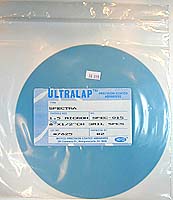The Spectra Ultralap
The Spectra Ultralap is an excellent choice for polishing quartz and beryl gemstones. Learn how to use this lap and maximize its practical life.
3 Minute Read
The Spectra Ultralap is Ideal for Quartz and Beryl Final Polish
Although I know people who have good luck with other Ultralaps, I think the Spectras are particularly ideal for putting a final polish on quartz and beryl. I've found nothing as convenient or better than these for just popping in the final polish, especially on quartz.
Notice I said final polish. Quartz needs a good-quality pre-polish. I recommend using a NuBond 1,200 composite lap or a 3,000 grit lap for pre-polishing both quartz and beryl. These laps are ideal for these materials. However, because these laps (especially the NuBond 1,200) leave so fine a pre-polish on facets, they tend to leave some orange peel on other materials, like garnet and tourmaline. Therefore, I don't use them for those gemstones.
The NuBond 1,200 also completely eliminates that odd random scratch that steel (diamond) laps tend to leave on quartz. (If you've had this problem, then you know what I'm talking about).
Preparing a Master Lap for Your Spectra Ultralap
Ultralaps are easy to use. However, you'll need to place your thin Ultralap onto another lap. This base lap is known as a master lap.
Polish is on the dull side.
I use my NuBond 1,200 lap as the master lap for my Ultralaps, because I figure that if I pre-polished with it, then the settings will be the same. (No cheat is required).
I just use water for the seal beyond the Ultralap and master lap. Some people use a little bit of dish soap in their water to help make a good seal. Make sure you do have a good seal without air bubbles between the laps. Otherwise, the Ultralap could slip loose.
Below are photos of me placing a Spectra Ultralap on my NuBond 1,200.
Easy Does It
The biggest mistake that most people make when using Ultralaps is applying too much pressure. This will make the stone you're trying to polish dig into the lap. When this happens, you'll gouge and damage the lap. That gouged spot on the lap will then sort of skip and bump. The lap is still usable, but you'll have to use the good areas and avoid the gouged spot.
Too much pressure will also create round facets and, sometimes, a wrinkle in your polish on the face of the facet. Light but firm pressure with a gently sweeping motion across the lap is the best method. Once you've used an Ultralap a few times, you'll get the hang of it.
Recharging Your Spectra Ultralap
The secret to good polishing and extending the life of your Ultralap has two parts:
- Don't gouge your lap
- Recharge your lap as you polish
I always use cerium oxide mixed with water as I polish. (This mixture should have the consistency of something like whole milk). This will extend the life of your Ultralaps tremendously. I often use the same lap for months and polish a lot of stones with a single lap.
Don't forget that you can use alumina oxide on a Spectra Ultralap, too. I find that a Spectra charged with alumina oxide is great for eliminating those little horsehair scratches I get once in a while when polishing tourmaline on a tin lap. Sometimes, when polishing a garnet or tourmaline, you might encounter a facet or two that just doesn't want to polish all the way. A Spectra charged with alumina oxide will almost always solve the problem.
Always remember: don't mix oxide polishes on the same Ultralap. Use separate Ultralaps for each polish and store them separately.
Jeff R. Graham
The late Jeff Graham was a prolific faceter, creator of many original faceting designs, and the author of several highly-regarded instructional faceting books such as Gram Faceting Designs.
Related Articles
Should You Cut the Gem Pavilion First?
Tips for Polishing Kunzite
Michael Hing’s Jubilee Project
Why All Gem Designs are Compromises
Latest Articles
Classic Engagement Ring Stones
Broken Bangle — The Blunder-Besmirched History of Jade Nomenclature: Book Review
Cuprite Value, Price, and Jewelry Information
Gemstone Radiation Treatment
Never Stop Learning
When you join the IGS community, you get trusted diamond & gemstone information when you need it.
Get Gemology Insights
Get started with the International Gem Society’s free guide to gemstone identification. Join our weekly newsletter & get a free copy of the Gem ID Checklist!
